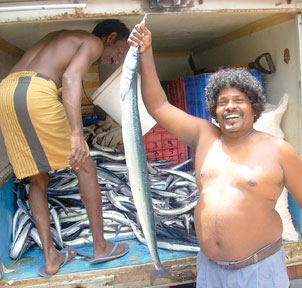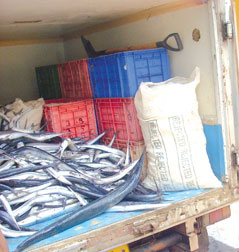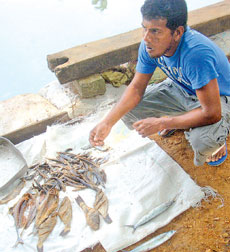Jadi, Dodanduwa's delicacy
By Ananda KANNANGARA
Our journey to Dodanduwa in Ambalangoda in the South, last Wednesday
was strenuous but interesting and memorable as it gave us a unique
opportunity to see the jadi fish (potted fish) manufacturing process and
also the livelihood of jadi manufacturers.
 |
|
Kumarasiri preparing to
make jadi |
History reveals that Dodanduwa has been famous for jadi even before
the Portuguese arrived in the island during 1500 AD. During the colonial
period the Dutch, Portuguese and British rulers had encouraged
fisherfolk in Dodanduwa to carry on their traditional jadi industry.
They also manufactured dry fish in addition to Jadi.
Jadi is salty but tasty. Even today people say that rice could be
eaten with only a tasty jadi curry. Jadi is made out of varieties of
fish such as Kumbalawa, Hurulla, Alagoduwa, Bala fish and Kelawalla.
Jadi could be made even from other varieties such as cuttle fish and
seer fish.
Unlike at present, villagers in Dodanduwa had a history dating back
eigh decades in making large quantity of jadi in their homes. Even
foreign nationals passing Ambalangoda stopped at Dodanduwa to have lunch
with Jadi fish.
Jadi manufacturers prepared lunch for foreigners in their cadjan
roofed huts.
A prominent Jadi manufacturer, K.W. Kumarasiri said Dodanduwa has
been famous for Jadi industry for the past 100 years.
He said like Kalpitiya was famous for dry fish, Dodanduwa is famous
for Jadi. At present over fifty families in Dodanduwa are engaged in the
jadi manufacturing industry as a self employment project.
Kumarasiri said Indian merchants who exchanged goods with Sri Lankan
traders for eight decades were in the habit of exchanging Indian
manufactured tiles to our Jadi.
They bought a large quantity of locally made jadi for South Indian
markets.
Even today people from all parts of the country including the North
visit Dodanduwa to buy jadi. This is manufactured even in other areas,
but Dodanduwa jadi has come to the top of the list like pineapple in
Nawala, cashew in Bataleeya and mangosteen in Kalutara.
Kumarasiri, who also sells fresh fish and makes dry fish for the past
15 years said jadi is mostly made during the season and not during the
off season.
He said in addition he makes maldive fish. The jadi manufacturing
process is not difficult; even housewives could make jadi for their home
consumption.
 |
|
Varieties of fish that
are used to make jadi |
The fish should be sliced first. Wash the sliced fish with either sea
water or salt water and leave it for about twenty minutes. Place a layer
of mixed salt powder and goraka with a few lime leaves (Dehi kola) on
the bottom of a clay pot, a plastic can or a wooden barrel.
Thereafter, the sliced fish should be placed on the layer.
Place another layer of mixed salt powder and goraka on the sliced
fish. At least two to three layers should be placed in this way. Do not
let flies come inside when making jadi to get rid of worms.
Keep the jadi pot closed for about two weeks or more. The processed
jadi could be kept from three weeks even up to one year. We also visited
a small islet near Beruwala in searching for people being engaged in the
Jadi industry.
The islet is ocatd 5 kilometres from the shore and about ten fisher
families are living in their temporarily erected huts.
A fisherman, 65-year-old Gunadasa Fernando whose livelihood is making
jadi said he made jadi with kumbalawa and hurulla. Gunadasa earns Rs.
15,000 a month by selling jadi.
He said he has been involved in the fishing industry for the past 45
years and he was in Kalpitiya during his school days.
"My parents were also involved in the fishing industry and I too went
fishing with my father during my school days", he said.
The story of Gunadasa's married life is interesting. While fishing in
the sea at Kalpitiya he had met another group of fishermen who were
fishing close to Kalpitiya.
The fishermen were from Beruwala in the down South. Gunadasa one day
visited Beruwela to see the friends. There he met a daughter of a
fisherman. Now Gunadasa is permanently living at Beruwala and he is
engaged in the Jadi making industry. He said Kalpitiya fishermen are
mostly engaged in dry fish and maldive fish manufacturing industry.
Gunadasa is of the view that almost all jadi manufacturers in
Beruwala are not in a sound financial position. Most of them do not have
proper houses, they live in wattle and daub houses. Their children have
stopped their education due to poverty.
He requested authorities to look into their grievances and help the
fisher community at least by granting bank loans to construct houses.
Recalling his younger days at Kalpitiya, Gunadasa said there are
several islands close to Kalpitiya and the majority people in the
district were engaged in the fishing industry.
He said among them at least 50 families even today are engaged in
jadi making industry.
Battalan Gunda is the second largest island next to Kalpitiya and it
is located nearly thirty kilometres away from the mainland.
 |
|
A worker cleaning the
fish |
The other large islands in the Kalpitiya are Rodhapaduwa,
Mohottuwarana and Keeramundilam. In addition, the North- Western
Province has over twenty other small islands.
Kalpitiya island was connected with the mainland during the Dutch
period by a bridge.
The objective of this amalgamation was to help fisher families, dry
fish manufacturers and the agricultural farmer community to sell their
goods.
The Kalpitiya Bridge is about 10 feet long. Even the Coal power plant
at Norochcholai is located in the district.
A longstanding jadi manufacturer Ajith Ananda of Ambalangoda said at
least 100 families in the area are currently engaged in the industry and
many of them are very poor.
He proposed the fishing authorities to visit them often and look into
their problems.
He said even the banks in the area do not grant them loans on the
grounds that the fishing industry has become a temporary job.
A fishing craft owner, 56-year-old R. Namadasa said many fishermen in
Ambalangoda and Dodanduwa areas have decided to hold monthly fairs to
sell their products such as fresh fish, dry fish and jadi to people
passing their areas.
|


